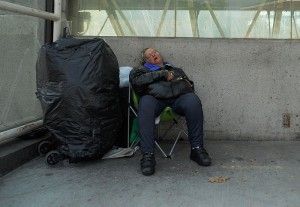Homeless bill hurts more than helps
By Steven Greenhut
SACRAMENTO — The Homeless Bill of Rights, the name applied to a bill that recently soared through the California Assembly’s Judiciary Committee on a 7-2 vote, is the latest in a long line of legislation that has grabbed national attention for its sheer outlandishness. It’s not too far-fetched to fear that, eventually, California’s “differently sheltered” will be the only residents left with any rights.
AB 5’s worst provisions have been stripped away, and I doubt the governor would sign something that so thoroughly offends municipal officials, but the proposal does epitomize so much of the thinking that dominates this state’s government. Legislators in all states introduce unorthodox stuff to make a point. But in California, strange bills can actually make it to the governor’s desk.
The homeless bill’s author, Assemblyman Tom Ammiano, D-San Francisco, deserves credit for at least identifying a real problem, noteworthy in a Legislature that too often avoids reality. Homelessness is rampant in much of California, and the troubled people who wander our streets often have nowhere to go as they get chased from one location to the next.
Homelessness is a vexing problem, but the solution is not to make the homeless a protected class, with a constitutional right to urinate on sidewalks and accumulate piles of vermin-infested belongings in city parks. Instead of giving the homeless a place to live, the state government wants to give them taxpayer-subsidized lawyers.
The bill features overwrought civil-rights-inspired language. It notes that California has “a long history of discriminatory laws and ordinances that have disproportionately affected people with low incomes.” The language refers to Jim Crow laws and Depression-era anti-Okie laws.
Cities here struggle — sometimes clumsily and unfairly – with throngs of people who camp out in city parks and sleep on sidewalks and in public doorways. There is a legitimate public issue here.
When I worked in a downtown Sacramento office building, my colleagues and I joked about seeming to be in a scene from a zombie movie. As we walked down the street, homeless people would shuffle toward us, hands out, appealing for money. One of my reporters was assaulted by a homeless person.
And in a well-publicized incident near my old office, a homeless woman shot a man in a wheelchair after he told her to get a job. It’s not always unreasonable to try to shoo them away.
Just pawns in their game
The homeless — many of whom are mentally ill or have substance-abuse issues — need compassion and social services (preferably ones provided by nonprofits, rather than by government bureaucracies, too often focused more on their own employees). Instead, they are used as pawns in a politician’s posturing.
The most objectionable language in the Ammiano bill has been removed. Critics pointed to the now-deleted provision that guaranteed homeless people “the right to engage in life-sustaining activities that must be carried out in public spaces.” That includes eating, congregating, collecting personal property and urinating. I’ve known nonhomeless people who have received a citation for peeing in public, but a homeless person would have been exempt had the original language remained intact.
Legislators also stripped away a provision that would have banned private businesses from discriminating against homeless people, which would have resulted in restaurants and hotels becoming a haven for these folks. And forget about private-property rights.
The current version still includes the right to panhandle, the right to occupy public spaces, the right to fish through trash receptacles in search of recyclables, the right to sleep in a car and the right to taxpayer-funded legal counsel if a municipality issues a citation to a homeless person for any of the protected activities. The legislation also requires the state to fund homeless shelters and “hygiene centers.”
Harmful regulation
Unfortunately, Ammiano’s legitimate points — i.e., how local governments make it difficult at times for nonprofits and churches to hand out food and operate homeless shelters — are lost in the outrage.
It would be nice if homeless advocates recognized the degree to which governmental regulations such as rent control, excessive building regulations, union wage requirements, governmental red tape and restrictive land-use policies drive up the cost of housing and punish organizations that want to help out.
Years ago, I wrote about the way some cities had harassed poor people who lived in cheap motels, forcing them to move every 30 days to keep the motels from becoming permanent homes for the poor. No one wants to live in a crummy motel, but such shelter is better than living outside, near the train tracks. Ammiano ought to contact Anaheim’s Mayor Tom Tait, who worked out fair-minded rules to help these people.
By taking a trial lawyer’s approach to homelessness, activists fail to make distinctions between those who are on the streets due to mental and social problems and those who simply lack shelter. That approach does a disservice to everyone.
But I wonder if the activists’ goal is to help these troubled people or to posture, litigate and give grandiose speeches. In my view, the Homeless Bill of Rights is a microcosm of California’s political problem, and a reminder that the only real solutions to any real problem often are found outside the Legislature’s strange, insulated world.
Steven Greenhut is vice president of journalism at the Franklin Center for Government and Public Integrity. Write to him at: [email protected].
Related Articles
Pensions at heart of bankruptcy
April 1, 2013 By Steven Greenhut SACRAMENTO — Few nonlocal people typically pay much attention to the goings-on in Stockton,
CA housing policies clash in Encinitas
How much can state and federal law dictate local housing policy? That confrontation has turned over headlines in Encinitas, where




